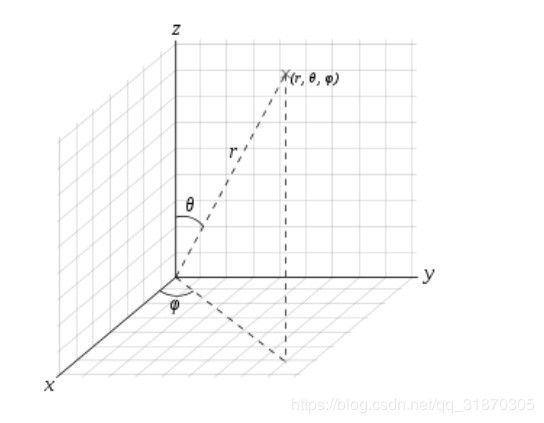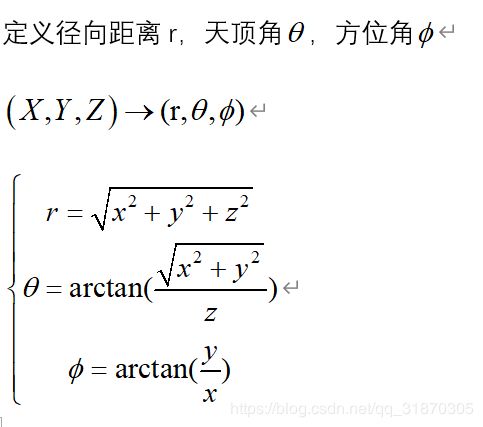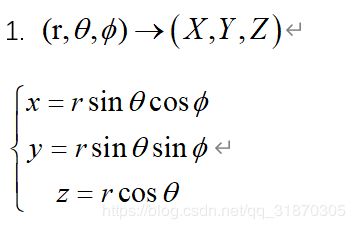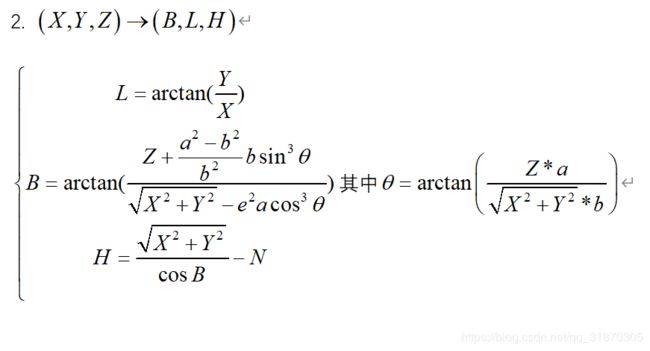- python解析风云4B生成真彩云图
小天丶1
气象数据处理python开发语言
文章目录概要话不多数开整小结概要真彩色云图需要根据通道Channel01,通道Channel02,通道Channel03进行通道融合处理,大致思路:三个通道对于RGB三个颜色管道,然后合并成一个三通道图像,其余云图在历史文档里有python解析风云4B,生成红外云图、可见光云图、水汽云图https://blog.csdn.net/qq_38197010/article/details/146549
- java运行python脚本同时实现传参响应接收
小天丶1
javapythonjava开发语言
提示:文章写完后,目录可以自动生成,如何生成可参考右边的帮助文档文章目录前言一、java部分示例二、python代码示例前言提示:这里可以添加本文要记录的大概内容:主要帮助从事java开发却涉及一些计算操作的时候发现没有python库更高效的解决方式提示:以下是本篇文章正文内容,下面案例可供参考一、java部分示例//调用Python脚本//pythonl路径pythonl路径Stringpyth
- 2025华为od机试真题B卷【停车场费用统计】Python实现
MISAYAONE
OD机试华为odpython开发语言华为od机试2025B卷
目录题目思路Code题目停车场统计当日总收费,包月的车不统计,不包月的车半个小时收一块钱,不满半小时不收钱,如果超过半小时,零头不满半小时按半小时算,每天11:30-13:30时间段不收钱,如果一辆车停车时间超过8小时后不收费。现提供停车场进出车辆的统计信息,需要你来计算停车场统计当日的总收费。输入描述第一行输入一个整数n表示今日进出停车场的包月的车辆数下一个行输入包月车的车牌号,以空格分割接下来
- 成为高级Python开发人员的完整学习路线与核心知识体系
引言Python已成为全球最受欢迎的编程语言之一,其简洁的语法和强大的生态系统使其在数据科学、Web开发、自动化、人工智能等领域占据重要地位。然而,从初级Python程序员到真正的高级开发人员,需要掌握一系列深入的知识点和实践经验。本文将详细介绍成为高级Python开发人员必备的核心知识体系,并提供系统化的学习资源,帮助你规划专业发展路径。第一部分:Python语言基础进阶1.Python语言特性
- 2025.06.11华为暑期实习机试真题【物流运输】Java/Python/C++/JS/C 实现
MISAYAONE
python华为java华为暑期实习机试c++
目录题目思路Code题目物流公司每天都要处理很多物流的运输工作,整个城市共有N个地点。共有N-1条公路,每2个地点之间都能通过公路连通。物流公司总部位于1号地点。今天有一辆物流运偷车共有M条物流运输任务,物流运输车每天的工作流程如下:先要从总部出发去收取所有的寄件货物,收到所有货物后回到总部扫描货物,再从总部出发将货物送至所有的送件地址,送完后最终回到总部,算作完成了今天的运输工作,请问该辆物流运
- Y-Combinator推导的Golang描述
武昌库里写JAVA
面试题汇总与解析springbootvue.js宠物管理课程设计java
缘起在做计算的本质指称语义的时候,遇到了需要在Python匿名递归调用。Python的lambda表达式本身不支持,需要借助Y-Combinator技术实现。于是研究了下Y-Combinator。中文世界了很多Blog介绍和推导Y-Combinator的文章。然而大部分的文章都省略了推导的关键步骤和推导的依据。仿佛读者都默认已经懂得Y-Combinator了。最后我在Youtube上找到了Ruby
- 树莓派实验——人脸识别
Rounie
opencvpython计算机视觉
importnumpyasnp#导入numpy科学计算库importcv2#导入OpenCV函数库#装载人脸识别特征文件face_cascade=cv2.CascadeClassifier('/usr/local/lib/python3.5/dist-packages/cv2/data/haarcascade_frontalface_alt.xml')cap=cv2.VideoCapture(0)
- 2024年Python最全人脸检测实战高级:使用 OpenCV、Python 和 dlib 完成眨眼检测
2401_84691757
程序员pythonopencv开发语言
然而,一旦人眨眼(右上),眼睛的纵横比就会急剧下降,接近于零。下图绘制了视频剪辑的眼睛纵横比随时间变化的图表。正如我们所看到的,眼睛纵横比是恒定的,然后迅速下降到接近零,然后再次增加,表明发生了一次眨眼。在下一节中,我们将学习如何使用面部标志、OpenCV、Python和dlib实现眨眼检测的眼睛纵横比。使用面部标志和OpenCV检测眨眼==============================
- Python的内存管理
星辰灬
Pythonpythonpycharm
Python的内存管理在Python中,内存管理涉及到一个包含所有Python对象和数据结构的私有堆(heap)。这个私有堆的管理由内部的Python内存管理器(Pythonmemorymanager)保证。Python内存管理器有不同的组件来处理各种动态存储管理方面的问题,如共享、分割、预分配或缓存。内存管理机制动态内存分配:Python使用动态内存分配,这意味着它在运行时动态分配和管理内存,而
- 【Tkinter从入门到精通】Python原生GUI开发全指南
满怀1015
python开发语言TkinterGUI开发桌面应用界面设计
目录前言️技术背景与价值当前技术痛点️解决方案概述目标读者说明一、技术原理剖析核心概念图解核心作用讲解关键技术模块说明⚖️技术选型对比️二、实战演示⚙️环境配置要求核心代码实现案例1:基础窗口创建案例2:网格布局计算器案例3:文件选择对话框✅运行结果验证⚡三、性能对比测试方法论量化数据对比结果分析四、最佳实践✅推荐方案❌常见错误调试技巧五、应用场景扩展适用领域创新应用方向生态工具链✨结语⚠️技术局
- 【模型部署】如何在Linux中通过脚本文件部署模型
满怀1015
人工智能linux网络人工只能模型部署
在Linux中,你可以将部署命令保存为可执行脚本文件,并通过终端直接调用。以下是几种常见且实用的方法:方法1:Shell脚本(推荐)步骤创建一个.sh文件(例如start_vllm.sh):#!/bin/bashCUDA_VISIBLE_DEVICES=7\python-mvllm.entrypoints.openai.api_server\--served-model-nameQwen2-7B-
- 如果用于AI评课系统的话——五款智能体比较
东方-教育技术博主
人工智能应用人工智能
你目前的项目特点是:已经具备了课堂文本分析、大模型对话系统、课堂视频分析的技术模块;计划通过智能体调用你现有的Python分析脚本,实现数据分析、自动可视化,并与教师互动;更强调多智能体协作、流程灵活编排,以及循证研究的交互分析。因此,我们重点考量生态成熟度、流程编排能力、多智能体协作能力、易用性四个维度。下面逐个分析你提到的框架:智能体框架综合对比分析:框架生态成熟度多智能体能力流程编排能力易用
- 如何用Python实现基础的文生视频AI模型
AI学长带你学AI
AI人工智能与大数据应用开发AI应用开发高级指南python音视频人工智能ai
如何用Python实现基础的文生视频AI模型关键词:文生视频、AI生成、扩散模型、多模态对齐、视频生成算法、Python实现、时间一致性摘要:本文系统讲解基于扩散模型的文生视频(Text-to-Video,T2V)AI模型的核心原理与Python实现方法。从技术背景到数学模型,从算法设计到项目实战,逐步拆解文本-视频跨模态对齐、时间序列建模、扩散生成等关键技术。通过PyTorch实现一个基础版文生
- 【Python GUI框架全解析】六大主流工具对比与实战指南
满怀1015
python开发语言GUI开发PyQtwxPythonKivy
目录前言️技术背景与价值当前技术痛点️解决方案概述目标读者说明一、技术原理剖析核心框架对比图框架定位分析关键技术指标️二、实战演示⚙️环境配置核心代码实现案例1:PyQt5现代化窗口案例2:wxPython文件管理器案例3:Kivy移动风格界面案例4:DearPyGui实时仪表盘✅运行结果验证⚡三、性能对比测试方法论量化数据对比结果分析四、最佳实践✅框架选型建议❌常见误区️调试技巧五、应用场景扩展
- WSL快速在Ubuntu或者Debian安装golang、python、deno、nodejs、java前后端全栈一体化开发环境配置
怪我冷i
云原生ubuntudebiangolangAI写作AI编程
安装golang#移除旧版本(如有)sudoaptremove--autoremove-ygolang#下载最新版(替换为官网最新版本号)wgethttps://go.dev/dl/go1.24.4.linux-amd64.tar.gz#解压到/usr/localsudorm-rf/usr/local/gosudotar-C/usr/local-xzfgo1.24.4.linux-amd64.ta
- python基础知识(二)
目录1.list和tuple1.1.list1.2.tuple2.dict和set2.1.dict2.2.set3.条件3.1.if3.2.if...else3.3.语法糖4.循环4.1.for...in4.2.while1.list和tuple1.1.listPython内置的一种数据类型是列表:list。list是一种有序的集合,可以添加和删除其中的元素。例如:>>>names=['liyan
- Python基础知识(IO编程)
yuxxto56
pythonpython
目录1.文件读写1.1.读文件1.2.字符编码1.3.二进制文件1.4.写文件2.操作文件和目录2.1.环境变量2.2.操作文件、目录1.文件读写读写文件是Python语言最常见的IO操作。通过数据盘读写文件的功能都是由操作系统提供的,读写文件就是请求操作系统打开一个文件对象(通常称为文件描述符),然后,通过操作系统提供的接口从这个文件对象中读取数据(读文件),或者把数据写入这个文件对象(写文件)
- python键盘输入转换为列表_Python键盘输入转换为列表的实例
云云众生w
python键盘输入转换为列表
Python键盘输入转换为列表的实例发布时间:2020-08-1912:58:38来源:脚本之家阅读:92作者:清泉影月Python输入字符串转列表是为了方便后续处理,这种操作在考试的时候比较多见。1.在Python3.0以后,键盘输入使用input函数eg1.>>>x=input>>>123123在命令行没有任何显示,输入123后直接赋值给x,并打印。eg2.>>>x=input("请输入...
- Python中的语法糖介绍
硅星纯牛码
pythonpython
Python中的语法糖介绍1.魔法方法(magicmethods)基础魔法方法属性相关的魔法方法2.装饰器(decorators)内置装饰器@property:让方法变为虚拟属性@classmenthod:定义类方法@staticmethod:定义静态方法functools中的装饰器functoolswraps:保留元数据functoolslru_cache:缓存计算结果3.推导式(compreh
- Python 爬虫实战:12306 订单记录爬取(登录态保持 + 订单数据可视化)
西攻城狮北
python爬虫信息可视化
引言在大数据驱动的今天,12306作为国内最重要的铁路出行平台,积累了海量的出行数据。对于广大用户而言,能够方便地查看和分析自己的出行订单记录,不仅有助于行程管理,还能为未来的出行规划提供有力参考。本文将详细讲解如何利用Python爬虫技术实现12306的模拟登录,爬取个人订单记录,并通过数据可视化技术直观展示出行情况。一、环境搭建与准备工作(一)Python环境配置确保本地已安装Python3.
- 2.setuptools使用
行循自然-kimi
深度学习python
setuptools使用安装pippipinstallsetuptoolsapt源安装apt-getinstallpython-setuptools使用模块安装easy_installpackage-name模块卸载easy_install-mpackage-name使用setuptools来配置工程在工程目录下面新建setup.py.增加内容fromsetuptoolsimportsetup,f
- Python每日一库:setuptools - 现代Python包分发工具
Aerkui
Python库学习python开发语言
1.库简介setuptools是Python生态系统中最重要的包分发工具之一,它是distutils的增强版,提供了更多功能和更好的用户体验。setuptools不仅支持基本的包分发功能,还提供了依赖管理、入口点、开发模式等高级特性,是现代Python包开发的标准工具。2.安装方法pipinstallsetuptools3.核心功能详解3.1创建setup.py文件fromsetuptoolsim
- 探索Gemini Balance:Google Gemini API的代理与负载均衡解决方案
几道之旅
人工智能智能体及数字员工负载均衡运维人工智能
引言在人工智能领域,API的高效使用和管理至关重要。尤其是当涉及到Google的GeminiAPI时,为了实现更稳定、更高效的服务,我们需要一个强大的代理和负载均衡工具。今天,我们就来深入了解一下GeminiBalance这个开源项目,它为GeminiAPI的使用提供了全面而灵活的解决方案。项目概述GeminiBalance是一个基于PythonFastAPI构建的应用程序,主要用于提供Googl
- 提名 Apache ShardingSphere Committer,说说方法
优质资源分享学习路线指引(点击解锁)知识定位人群定位Python实战微信订餐小程序进阶级本课程是pythonflask+微信小程序的完美结合,从项目搭建到腾讯云部署上线,打造一个全栈订餐系统。Python量化交易实战入门级手把手带你打造一个易扩展、更安全、效率更高的量化交易系统文章首发在公众号(龙台的技术笔记),之后同步到博客园和个人网站:xiaomage.info就在前几天,收到了ApacheS
- python内置函数——enumerate()
Believer_abby
python内置函数python
说明:emumerate()函数用于将一个可遍历的序列(如列表,元组或字符串)组合为一个索引序列,同时列出数据和数据下标,一般用在for循环中。语法:enumerate(sequence,[start=0])参数:sequence:表示一个序列、迭代器或其他支持迭代的对象;start:下标起始位置,默认为0。使用:seasons=['spring','summer','fall','winter'
- 【Python基础】07 实战:批量视频压缩的实现
智算菩萨
python服务器开发语言
前言在数字化时代,视频内容已成为信息传播的主要载体。无论是个人用户还是企业,都面临着大量视频文件存储和传输的挑战。视频文件通常体积庞大,占用大量存储空间,同时在网络传输时也会消耗大量带宽。因此,一个高效、易用的视频压缩工具变得尤为重要。本文将详细介绍一个基于Python开发的批量视频压缩工具,该工具结合了现代图形界面设计和强大的FFmpeg视频处理能力,为用户提供了一站式的视频压缩解决方案。通过本
- 男模Python 函数命名以及鸡兔同笼函数
pythonyuanke
python开发语言
那么问你一个问题,现在是不是所有的函数都是def开头的?如果def就是函数的名字,那么python怎么区分该调用哪一个函数?名字都一样啊那也就是def后面的是函数名字?def后面,括号前面参数列表,这里的参数指的是形式参数,就是括号里面的部分这里只有一个形式参数,所以没有逗号,如果有多个形式参数,那么用逗号分隔参考我们在world.py里面写的几个函数,比如defadd(a,b)你说一下它的名字和
- Python 开发规范:pdb & cProfile:调试 & 性能分析
写文章的大米
Python核心技术python
↑↑↑欢迎点赞、关注、收藏!!!,10年IT行业老鸟,持续分享更多IT干货文章目录pdb&cProfile:调试&性能分析核心内容1、调试和性能分析的必要性2、pdb调试工具3、cProfile性能分析工具pdb&cProfile:调试&性能分析核心内容1、调试和性能分析的必要性在实际生产环境中,代码调试(找问题根因、修复bug)和性能分析(优化效率、减少latency)是开发关键环节。尤其,面对
- Python私有属性:隐藏数据的秘密武器
有奇妙能力吗
知识分享Pythonpython开发语言
Python私有属性详解:为什么我们需要“隐藏”对象的数据?一、引言在面向对象编程中,封装(Encapsulation)是三大基本特性之一(另外两个是继承和多态)。而“私有属性”就是实现封装的重要手段之一。在Python中虽然不像Java或C++那样严格区分访问权限,但依然提供了一种机制来限制对类内部属性的直接访问。本文将带你深入了解:什么是私有属性?如何定义私有属性?私有属性的原理与注意事项使用
- Python中filter()函数详解
有奇妙能力吗
Python知识分享python开发语言
什么是filter()?filter()是Python内置的一个函数,它的作用是:从一个可迭代对象(如列表、元组等)中筛选出符合条件的元素,生成一个新的迭代器。你可以把它理解成一个“过滤器”:你给它一堆数据和一个筛选条件,它会帮你把符合这个条件的数据挑出来。基本语法filter(函数,可迭代对象)第一个参数是一个函数,它用来判断每个元素是否符合条件。第二个参数是一个可迭代对象,比如列表、元组、字符
- Java 并发包之线程池和原子计数
lijingyao8206
Java计数ThreadPool并发包java线程池
对于大数据量关联的业务处理逻辑,比较直接的想法就是用JDK提供的并发包去解决多线程情况下的业务数据处理。线程池可以提供很好的管理线程的方式,并且可以提高线程利用率,并发包中的原子计数在多线程的情况下可以让我们避免去写一些同步代码。
这里就先把jdk并发包中的线程池处理器ThreadPoolExecutor 以原子计数类AomicInteger 和倒数计时锁C
- java编程思想 抽象类和接口
百合不是茶
java抽象类接口
接口c++对接口和内部类只有简介的支持,但在java中有队这些类的直接支持
1 ,抽象类 : 如果一个类包含一个或多个抽象方法,该类必须限定为抽象类(否者编译器报错)
抽象方法 : 在方法中仅有声明而没有方法体
package com.wj.Interface;
- [房地产与大数据]房地产数据挖掘系统
comsci
数据挖掘
随着一个关键核心技术的突破,我们已经是独立自主的开发某些先进模块,但是要完全实现,还需要一定的时间...
所以,除了代码工作以外,我们还需要关心一下非技术领域的事件..比如说房地产
&nb
- 数组队列总结
沐刃青蛟
数组队列
数组队列是一种大小可以改变,类型没有定死的类似数组的工具。不过与数组相比,它更具有灵活性。因为它不但不用担心越界问题,而且因为泛型(类似c++中模板的东西)的存在而支持各种类型。
以下是数组队列的功能实现代码:
import List.Student;
public class
- Oracle存储过程无法编译的解决方法
IT独行者
oracle存储过程
今天同事修改Oracle存储过程又导致2个过程无法被编译,流程规范上的东西,Dave 这里不多说,看看怎么解决问题。
1. 查看无效对象
XEZF@xezf(qs-xezf-db1)> select object_name,object_type,status from all_objects where status='IN
- 重装系统之后oracle恢复
文强chu
oracle
前几天正在使用电脑,没有暂停oracle的各种服务。
突然win8.1系统奔溃,无法修复,开机时系统 提示正在搜集错误信息,然后再开机,再提示的无限循环中。
无耐我拿出系统u盘 准备重装系统,没想到竟然无法从u盘引导成功。
晚上到外面早了一家修电脑店,让人家给装了个系统,并且那哥们在我没反应过来的时候,
直接把我的c盘给格式化了 并且清理了注册表,再装系统。
然后的结果就是我的oracl
- python学习二( 一些基础语法)
小桔子
pthon基础语法
紧接着把!昨天没看继续看django 官方教程,学了下python的基本语法 与c类语言还是有些小差别:
1.ptyhon的源文件以UTF-8编码格式
2.
/ 除 结果浮点型
// 除 结果整形
% 除 取余数
* 乘
** 乘方 eg 5**2 结果是5的2次方25
_&
- svn 常用命令
aichenglong
SVN版本回退
1 svn回退版本
1)在window中选择log,根据想要回退的内容,选择revert this version或revert chanages from this version
两者的区别:
revert this version:表示回退到当前版本(该版本后的版本全部作废)
revert chanages from this versio
- 某小公司面试归来
alafqq
面试
先填单子,还要写笔试题,我以时间为急,拒绝了它。。时间宝贵。
老拿这些对付毕业生的东东来吓唬我。。
面试官很刁难,问了几个问题,记录下;
1,包的范围。。。public,private,protect. --悲剧了
2,hashcode方法和equals方法的区别。谁覆盖谁.结果,他说我说反了。
3,最恶心的一道题,抽象类继承抽象类吗?(察,一般它都是被继承的啊)
4,stru
- 动态数组的存储速度比较 集合框架
百合不是茶
集合框架
集合框架:
自定义数据结构(增删改查等)
package 数组;
/**
* 创建动态数组
* @author 百合
*
*/
public class ArrayDemo{
//定义一个数组来存放数据
String[] src = new String[0];
/**
* 增加元素加入容器
* @param s要加入容器
- 用JS实现一个JS对象,对象里有两个属性一个方法
bijian1013
js对象
<html>
<head>
</head>
<body>
用js代码实现一个js对象,对象里有两个属性,一个方法
</body>
<script>
var obj={a:'1234567',b:'bbbbbbbbbb',c:function(x){
- 探索JUnit4扩展:使用Rule
bijian1013
java单元测试JUnitRule
在上一篇文章中,讨论了使用Runner扩展JUnit4的方式,即直接修改Test Runner的实现(BlockJUnit4ClassRunner)。但这种方法显然不便于灵活地添加或删除扩展功能。下面将使用JUnit4.7才开始引入的扩展方式——Rule来实现相同的扩展功能。
1. Rule
&n
- [Gson一]非泛型POJO对象的反序列化
bit1129
POJO
当要将JSON数据串反序列化自身为非泛型的POJO时,使用Gson.fromJson(String, Class)方法。自身为非泛型的POJO的包括两种:
1. POJO对象不包含任何泛型的字段
2. POJO对象包含泛型字段,例如泛型集合或者泛型类
Data类 a.不是泛型类, b.Data中的集合List和Map都是泛型的 c.Data中不包含其它的POJO
- 【Kakfa五】Kafka Producer和Consumer基本使用
bit1129
kafka
0.Kafka服务器的配置
一个Broker,
一个Topic
Topic中只有一个Partition() 1. Producer:
package kafka.examples.producers;
import kafka.producer.KeyedMessage;
import kafka.javaapi.producer.Producer;
impor
- lsyncd实时同步搭建指南——取代rsync+inotify
ronin47
1. 几大实时同步工具比较 1.1 inotify + rsync
最近一直在寻求生产服务服务器上的同步替代方案,原先使用的是 inotify + rsync,但随着文件数量的增大到100W+,目录下的文件列表就达20M,在网络状况不佳或者限速的情况下,变更的文件可能10来个才几M,却因此要发送的文件列表就达20M,严重减低的带宽的使用效率以及同步效率;更为要紧的是,加入inotify
- java-9. 判断整数序列是不是二元查找树的后序遍历结果
bylijinnan
java
public class IsBinTreePostTraverse{
static boolean isBSTPostOrder(int[] a){
if(a==null){
return false;
}
/*1.只有一个结点时,肯定是查找树
*2.只有两个结点时,肯定是查找树。例如{5,6}对应的BST是 6 {6,5}对应的BST是
- MySQL的sum函数返回的类型
bylijinnan
javaspringsqlmysqljdbc
今天项目切换数据库时,出错
访问数据库的代码大概是这样:
String sql = "select sum(number) as sumNumberOfOneDay from tableName";
List<Map> rows = getJdbcTemplate().queryForList(sql);
for (Map row : rows
- java设计模式之单例模式
chicony
java设计模式
在阎宏博士的《JAVA与模式》一书中开头是这样描述单例模式的:
作为对象的创建模式,单例模式确保某一个类只有一个实例,而且自行实例化并向整个系统提供这个实例。这个类称为单例类。 单例模式的结构
单例模式的特点:
单例类只能有一个实例。
单例类必须自己创建自己的唯一实例。
单例类必须给所有其他对象提供这一实例。
饿汉式单例类
publ
- javascript取当月最后一天
ctrain
JavaScript
<!--javascript取当月最后一天-->
<script language=javascript>
var current = new Date();
var year = current.getYear();
var month = current.getMonth();
showMonthLastDay(year, mont
- linux tune2fs命令详解
daizj
linuxtune2fs查看系统文件块信息
一.简介:
tune2fs是调整和查看ext2/ext3文件系统的文件系统参数,Windows下面如果出现意外断电死机情况,下次开机一般都会出现系统自检。Linux系统下面也有文件系统自检,而且是可以通过tune2fs命令,自行定义自检周期及方式。
二.用法:
Usage: tune2fs [-c max_mounts_count] [-e errors_behavior] [-g grou
- 做有中国特色的程序员
dcj3sjt126com
程序员
从出版业说起 网络作品排到靠前的,都不会太难看,一般人不爱看某部作品也是因为不喜欢这个类型,而此人也不会全不喜欢这些网络作品。究其原因,是因为网络作品都是让人先白看的,看的好了才出了头。而纸质作品就不一定了,排行榜靠前的,有好作品,也有垃圾。 许多大牛都是写了博客,后来出了书。这些书也都不次,可能有人让为不好,是因为技术书不像小说,小说在读故事,技术书是在学知识或温习知识,有
- Android:TextView属性大全
dcj3sjt126com
textview
android:autoLink 设置是否当文本为URL链接/email/电话号码/map时,文本显示为可点击的链接。可选值(none/web/email/phone/map/all) android:autoText 如果设置,将自动执行输入值的拼写纠正。此处无效果,在显示输入法并输
- tomcat虚拟目录安装及其配置
eksliang
tomcat配置说明tomca部署web应用tomcat虚拟目录安装
转载请出自出处:http://eksliang.iteye.com/blog/2097184
1.-------------------------------------------tomcat 目录结构
config:存放tomcat的配置文件
temp :存放tomcat跑起来后存放临时文件用的
work : 当第一次访问应用中的jsp
- 浅谈:APP有哪些常被黑客利用的安全漏洞
gg163
APP
首先,说到APP的安全漏洞,身为程序猿的大家应该不陌生;如果抛开安卓自身开源的问题的话,其主要产生的原因就是开发过程中疏忽或者代码不严谨引起的。但这些责任也不能怪在程序猿头上,有时会因为BOSS时间催得紧等很多可观原因。由国内移动应用安全检测团队爱内测(ineice.com)的CTO给我们浅谈关于Android 系统的开源设计以及生态环境。
1. 应用反编译漏洞:APK 包非常容易被反编译成可读
- C#根据网址生成静态页面
hvt
Web.netC#asp.nethovertree
HoverTree开源项目中HoverTreeWeb.HVTPanel的Index.aspx文件是后台管理的首页。包含生成留言板首页,以及显示用户名,退出等功能。根据网址生成页面的方法:
bool CreateHtmlFile(string url, string path)
{
//http://keleyi.com/a/bjae/3d10wfax.htm
stri
- SVG 教程 (一)
天梯梦
svg
SVG 简介
SVG 是使用 XML 来描述二维图形和绘图程序的语言。 学习之前应具备的基础知识:
继续学习之前,你应该对以下内容有基本的了解:
HTML
XML 基础
如果希望首先学习这些内容,请在本站的首页选择相应的教程。 什么是SVG?
SVG 指可伸缩矢量图形 (Scalable Vector Graphics)
SVG 用来定义用于网络的基于矢量
- 一个简单的java栈
luyulong
java数据结构栈
public class MyStack {
private long[] arr;
private int top;
public MyStack() {
arr = new long[10];
top = -1;
}
public MyStack(int maxsize) {
arr = new long[maxsize];
top
- 基础数据结构和算法八:Binary search
sunwinner
AlgorithmBinary search
Binary search needs an ordered array so that it can use array indexing to dramatically reduce the number of compares required for each search, using the classic and venerable binary search algori
- 12个C语言面试题,涉及指针、进程、运算、结构体、函数、内存,看看你能做出几个!
刘星宇
c面试
12个C语言面试题,涉及指针、进程、运算、结构体、函数、内存,看看你能做出几个!
1.gets()函数
问:请找出下面代码里的问题:
#include<stdio.h>
int main(void)
{
char buff[10];
memset(buff,0,sizeof(buff));
- ITeye 7月技术图书有奖试读获奖名单公布
ITeye管理员
活动ITeye试读
ITeye携手人民邮电出版社图灵教育共同举办的7月技术图书有奖试读活动已圆满结束,非常感谢广大用户对本次活动的关注与参与。
7月试读活动回顾:
http://webmaster.iteye.com/blog/2092746
本次技术图书试读活动的优秀奖获奖名单及相应作品如下(优秀文章有很多,但名额有限,没获奖并不代表不优秀):
《Java性能优化权威指南》




